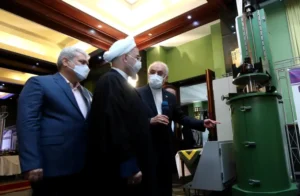Iran faces the EU’s unofficial deadline to accept the final draft of the 2015 nuclear deal. What will the final response be?

Iran faced the European Union’s unofficial deadline to accept the final draft to revive the 2015 nuclear deal on Monday by keeping up with its demands.
Iranian Foreign Minister Hossein Amir Abdollahian said Tehran will deliver its final response to Brussels later Monday.
“We are looking for a good, stable and strong agreement, but if the other party talks about plan B, we also have plan B,” he warned, according to Iranian journalist Sarah Massoumi.
Abdollahian claimed to Iranian journalists that Tehran has “shown relative flexibility on two issues,” likely referring to demands for the US to remove the Islamic Revolutionary Guard Corps from its list of foreign terrorist organizations and for the International Atomic Energy Agency to drop investigations into undeclared nuclear sites, which held up the negotiations for over five months. The US declined both demands, and the E3 – Britain, France and Germany – would not agree to the second.
Iran is “waiting for the flexibility of the American side in the third issue, which is guarantees,” Abdollahian said. He later added, in that vein, that the nuclear deal “has flaws like any other document, but the main flaw is that in the verification field, our commitments are fully investigated, but regarding the cancellation of sanctions, verification of the other party’s commitments is not very common.”
Comments by Iranian Foreign Ministry Spokesman Nasser Kan’ani made said that, though there was progress in recent nuclear talks in Vienna, the draft that the EU has called final “did not completely reach Iran’s legal demands.”
“Whether…this round of talks can [come] near an agreement depends on the other side, particularly the US, meeting Iran’s rightful demands,” he said.
Consultations were taking place at the highest levels in Tehran, Kan’ani added.
Nuclear talks
The 2015 Joint Comprehensive Plan of Action lifted sanctions on Iran in exchange for limitations on its nuclear program, which would expire over time, ending in 2030, with restrictions on the manufacture of advanced centrifuges expiring next year. The Trump administration left the deal in 2018, opting for more sanctions, instead, and the Biden administration began negotiating a return to the JCPOA early last year.
The EU, which coordinates the indirect talks between Iran and the US, has said that a draft it tabled earlier this month was final and that recent negotiations in Vienna were meant to deal with its technical aspects.
US Special Envoy Rob Malley said in an interview on Friday, that the US will not press for the International Atomic Energy Agency to close its investigations of undeclared nuclear sites in Iran.
The probes “will be closed when Iran provides the technically credible answers that the IAEA has requested of them… but not before,” Malley emphasized.
The IAEA investigation seeks answers from Iran as to where the uranium particles are now, in order to make sure that the nuclear material found at undeclared sites is “accounted for and that it’s under what is called safeguards,” the envoy explained.
Malley also denied a report in Politico over the weekend that said the EU also proposed to weaken US sanctions on the Islamic Revolutionary Guard Corps.
